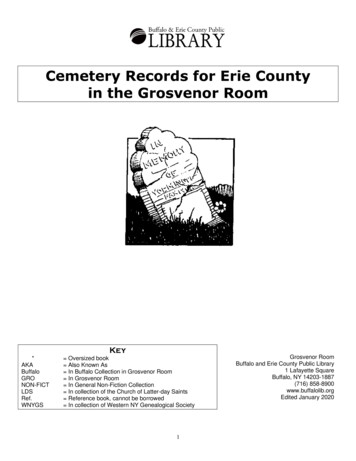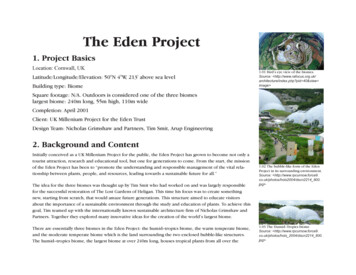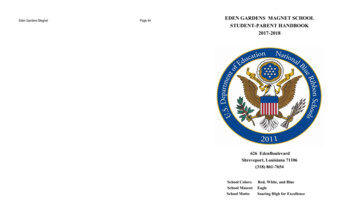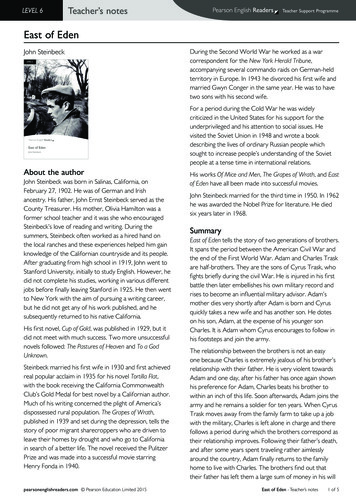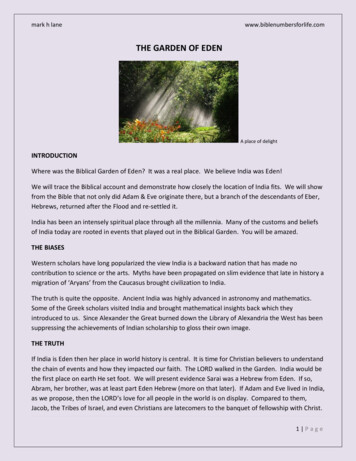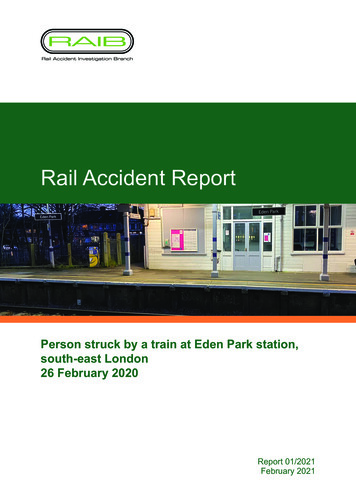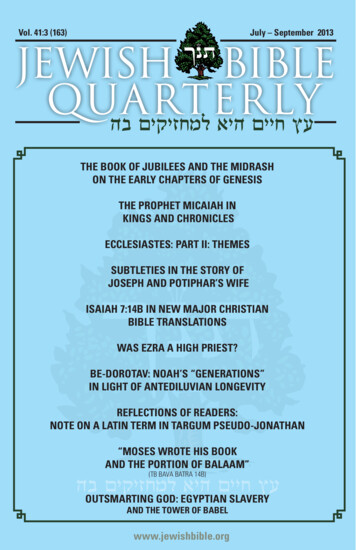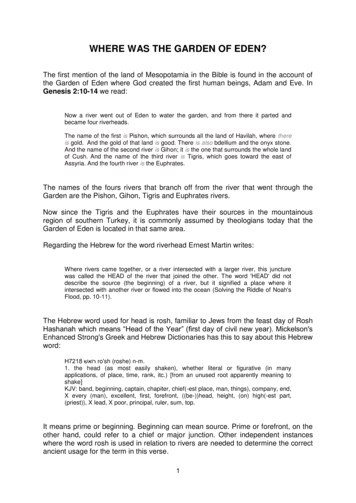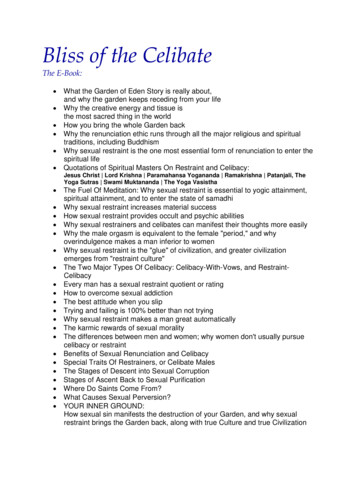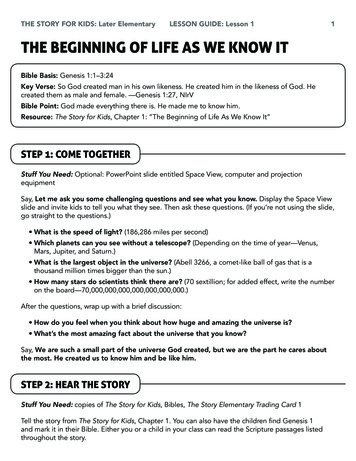
Transcription
NAMEEden ProjectSUBJECTAnnual ReviewYEAR2008/09
Please pass it onThat way we can save some treesDateFEBRUARY 2010Name
This is not your average annual review.We want to give you a feel for what Edenis about and what we’ve achieved in thepast year. From Mud Between Your Toesand Great Day Out, to Gardens for Lifeand Climate Revolution, Eden continues tobe a catalyst for change and a force to raiseawareness and tackle some of the toughestchallenges facing us and our world.This is our year we hope you enjoy it.We did!0406121620ContentsThis is a limited edition: Letter from Chief ExecutiveThis is a classroom: Eden’s approach to educationThis is a play station: The role of playThis is social networking: Better communicationThis is a return on investment: Working inthe community– 01 –263238414243This is illuminating: Operational performanceThis is asset management: Summary of financesThis is our future: Plans for future periodsWho’s whoList of fundersYour notes
– 02 –
‘ An area of tropical rainforest the size of a football pitch is destroyedevery four seconds. If we lose the battle against tropical deforestationwe lose the battle against climate change.’HRH, The Prince of Wales– 03 –
As I shuffled forward andintroduced myself to the startledcouple who had just gone throughticketing, I felt like the presenteron a supermarket challenge.‘Congratulations, you are the ten millionth visitor.’‘Who? Me or her?’ ‘Well, let me see’, I said, swiftlymoving on. I escorted them on to the viewingplatform for a photo opportunity, shook handsand presented them with Lifetime Membership.Ten million people is the combined populationsof the twenty smallest nations on earth or 0.16 ofthe largest.A year is a long time. We have described this yearas the one in which Eden has grown up. By thiswe mean that we are running the destination withconfidence and have resisted the desire to followtraditional paths of communication. The EdenProject is a limited edition. The way we approachthings and the way we communicate ourmessages are often unconventional. Ourambitions stretch to take the narrative abouthow we as a society can meet the extraordinarychallenges that the next forty years are going tothrow at us out into the wider world; a huge, andsome may say, unreasonable challenge. Well, Itake comfort from Mark Twain who remarked that– 04 –‘if reasonable men bend themselves to the waysof the world, it stands to reason that only theunreasonable can change it’.Eden should be about being unreasonable.Its very creation wasn’t reasonable. Many ofthe people that work here left fantastically goodjobs elsewhere to come and throw their lot inhere. That isn’t reasonable – is it? When you seethousands of families building dens in the arenain summer, or falling on their backsides skatingin the magical twinkliness of Time of Gifts in thewinter, you know it’s worth it. When you seethem gasping at the heat and abundance ofthe rainforest or the heady aromas of theMediterranean and then look anew at their ownworld outside the Biome doors – you know it’sworth it. When you meet the teachers from India,Kenya and the UK who are transforming the livesof thousands of children on our Gardens for Lifeprogramme or see the inspirational work of ourcommunities team with The Great Day Outprogramme which works with the socially
excluded, you know it’s worth it. Eden is aboutflesh and blood, the emotional responses andsolutions that come from conversations rounda thousand kitchen tables untainted by systems,processes and institutional policies. Eden isfirst and foremost about reminding us of ourdependence on, and connection to, the naturalworld. Our wonderful plant collections are asimple metaphor for this, our construction isinspired by this and the way we go about ourbusiness takes as its starting point an ecologicalperspective that is sometimes called SocialEnterprise; put simply it is a reflection on ourdesire to make what we have give the greatestpossible benefit to the widest number of people.We have plans, which included starting The BigLunch in July this year. Our hope was to encouragepeople to get out into the streets to meet theirneighbours and challenge the assumption that welive in a world going to hell in a handcart. We arenot; we are living at a time which will ask the bestof us and we believe we will not be found wanting.We can play a part in describing what a brightfuture might look like and how we might get thereand hope that our talent for friendship will createa culture that brings people of hugely varying lifeexperience and disciplines together, in an effortto challenge the way we do things. Progress hascome at such a price to our sense of wellbeingand to the condition of our planet, our moral– 05 –compass has been disoriented by over-respectfor the free market. Our democratic processesare overridden by the fear and needs of ‘now’and a misplaced belief that the past was a betterplace. It wasn’t and never has been. It is simplythe wailing of the weak and frightened by a futurewhich is ours to make.As long as there is life at Eden I hope that we willbe unreasonable in our desire to see an educationsystem that prepares us for living in the naturalworld, connected to it, respectful of it and allthat it does to sustain us. We are unreasonablein our hope that The Prince’s Rainforest Project,with its aspiration of reaching a global consensusand field of action for the conservation of therainforests, will work out. And – unreasonable inour demand that leaders should step up to theplate to deliver a vision that our hope deserves.The Age of Reason may have delivered to us theIndustrial Revolution and the giant leaps thatcame with it across all the sciences. However,reason’s use is tempered in the hands of mediocreambition and when that time has come, andit is now, the only answer is to be passionatelyunreasonable.Tim SmitChief Executive
– 06 –
The Eden Project is an educational charity aiming topromote the understanding of the vital relationshipbetween plants and people.– 07 –
When the Eden Project was built the theme ofpeople’s dependence on plants and the naturalworld was important- and the way Eden hasbrought it alive in many different ways hasattracted an audience of millions of people.This is about connections we dare not lose.It is about understanding who we are.Since then this theme has only become morerelevant; how to respond to the full gamut ofenvironmental challenges has become the mosturgent shared issue across the world. Thecommitment to an 80% reduction in carbonemissions by 2050 will demand the best of us:imaginative, collaborative social change andinnovation on a massive scale. And today’syoung people will grow up through a periodof extraordinary transformation.– 08 –Eden has an understanding of the barriers to thischange faced by individuals and an ability toengage on a personal level in order to:– Engage and excite people about theopportunities.– Provide people with examples of success they canrelate to, understand and copy.– Give them a compelling narrative and vision for abetter future.– Give them the support, training and network theyneed to effect change.The Eden narrative is one of our dependency onthe natural world in order to first help peoplerealise why we must change the way we currentlylive. Secondly, the Eden message is one of hope,optimism and inspiration, showing people how thenecessary adaptation can be achieved in a way thatis both believable and palatable. Thirdly, Eden’sinsight is that whilst individual action is important,it is only through collective action that we willachieve the degree of change required in theavailable timescales.
Our main objectives for 2008/09 were:To further develop Eden’s Mud betweenyour Toes programme and play activity.To expand Eden’s support for children’slearning and engagement outside school.To step up Eden’s involvement in localcommunity issues and development.To develop new income streams tosupport the educational work ofthe charity.To be more proactive in the explanationof Eden as a charity and our need tofundraise. he next 24 pages highlight our achievements andTperformance in striving to meet these objectives.– 09 –
During the year that ended 29 March 2009Eden welcomed some 1.06 million visitorsof which nearly 190,000 were children.This took the total number of visitorsto the Eden Project to over 10 millionin just its eighth year after full opening.Public EducationEvery one of our visitors will have been, to agreater or lesser extent, exposed to the uniqueeducational experience provided at Eden, withoutnecessarily feeling like they were ‘being educated’.We aim to offer an experience which is personal,relevant and a thought provoking voyage ofdiscovery.The core public education mission of Eden isbased on the premise that the 21st century isbringing many challenges: increasing energycosts, moving and rising populations, plant andanimal extinctions, food security issues andeconomic shifts – all set against a background ofclimate change. Anticipating all of the surprisesahead and the transformations we will livethrough is impossible.– 10 –Mankind’s creativity, ingenuity, understanding,science, technology, enterprise, humanity andability to maintain healthy communities andresilient societies will be imperative.Eden provides a stage on which we show some ofthe choices we can make to foster a better world:making connections between people’s lives andthe issues, building an understanding that wecan rise to the challenges and face the future withhope. Through storytelling, art and music we aimto engage, entertain, inspire the imagination andensure our messages linger in the memory.
Formal EducationIn addition to the members of the public, some47,262 school or college pupils visited during2008/9 in organised groups. We also welcomed5,445 visitors in organised groups from formaltertiary education centres and 21,852 studentsin further and higher education.Our core school programmes are participativeand interactive learning adventures that capturethe imagination and ‘hook’ the learners in, usingquests, challenges, simulations and role-play.In essence, Eden is encouraging discussionaround the nature of education and what we asa society seek from it. We’re reconnecting youngpeople with science: connecting them to theworld around them, and to life.We have spent many years refining ourunderstanding of the tools and methods toconvey these complicated issues and, in itself,this has been a learning curve for the Eden Team.Through future campaigns and communicationwe want to share this learning and engage withthe hard to reach sectors of the community.‘ Possibly one of the most educationally richvenues to have taken groups to visit. I wouldhope all pupils at our school could visit on aright of passage.’West Pennard School– 11 –
2008 saw 30,000 people take part in our Den Building campaign.It encouraged children and families to play together and engagewith the outdoors and, importantly, it ensured that they forgotabout their computer games for the day.– 12 –
– 13 –
Our Mud Between Your Toes programme,aimed at getting youngsters engaging withtheir outdoor environment, has gone fromstrength to strength.Children are spending less and less time outside.Not only are they missing out on a whole world offun, adventure and really cool games, but there aresome serious knock-on effects:– A generation that doesn’t understandor value the natural world will not striveto protect it– A generation that doesn’t value societywon’t work together to save it– The government says lack of play is asdamaging as junk food– By 2010 one in five children will beclinically obese– 14 –Play‘Changing the State of Play’ aims to connectchildren to nature through play. It has three broadthemes; to develop innovative nature-basedspaces, structures and activities on site. To designnature-based play spaces with community groupsacross Devon, Cornwall and the Isles of Scilly;and to work with children and adults to accessand play in and around natural, wild spaces.‘Changing the State of Play’ is funded by theBig Lottery Fund.
Left: Getting mud betweentheir fingers and toes reconnects children with theenvironment.Centre: Thursdays in Augustsaw 30 people a dayparticipate in the WildThursdays programme.Above: In the two years it’sbeen running, over 65,000have taken part in our denbuilding programme.Den BuildingIn 2008 another 30,000 people built dens overthe summer holidays making a grand total ofmore than 65,000 since we started this campaign.The idea is for those participating to discoverhow simple activities performed together canbe bonding, educational and fun.Wild ThursdaysOver the summer of 2008, families from all overthe country came and took part in a series ofmini challenges to practise team working skills,to get immersed in nature, discover, explore andtune in to the world around us.– 15 –Tasks ranged from building a shelter that resiststhe elements, making charms to ward off anylurking monsters, to toasting marshmallows onthe campfire. A wonderful mix of story, challenge,exploration, creativity, design, constructionand celebration.‘ Aimee liked collecting the leaves to coverthe den. Cara liked listening to the storyand making the candles. Mummy enjoyedworking together! Can’t think of anything tomake our day more awesome!’‘Wild Thursdays participant’
Eden SessionsOur Sessions attracted 25,683 people during 2008, many ofwhom came from a new and sometimes hard-to-reach audience.– 16 –
– 17 –
Much of what we do at Eden is aimedat communicating in non-conventionalways using music, art, performanceand storytelling.Through rock ‘n’ roll horticulture and excellentbands, to the Sexy Green Car Show andClimate Revolution Conference, we enticevisitors who would not otherwise come tothe Project. This creates a diverse networkof people we communicate with on a varietyof levels about climate change.Eden Sessions25,683 people attended the 2008 Eden Sessions,which included performances from The Verve,Kaiser Chiefs, Raconteurs, KT Tunstall and BillBailey. Sessions tickets included a day pass,which meant many gig-goers visited us thesame or following day.Climate Revolution –Sexy Green Car Show 2008Our Climate Revolution programme is based onthe fundamental belief: that the changes societywill undergo as a consequence of climate changeare at least as significant as the changes thathappened during the Industrial Revolution.– 18 –A prime example of the programme’s attitudeto positive change is the Sexy Green Car Show,reframing car efficiency as a desirablecharacteristic in its own right, and showcasingthe new technologies that will deliver the 90%efficiency improvements needed for cars.The show had 43,688 visitors and more cars frommore manufacturers: 2007’s pioneers from Ford,Saab, Volkswagen, Citroen and Toyota were joinedby Honda, Peugeot, SEAT, Fiat, Morgan and Lotuswho exhibited cars of enormous appeal neverbefore seen in the UK.Climate Revolution ConferenceOctober saw Eden hold its first Climate RevolutionConference for 14–18 year olds, during which theycould hear talks and participate in workshops onclimate change.
Above: Eden Grows Up,January 2009.Centre: Eden Sessionsincluded KT Tunstalland The Verve. BillBailey saw the Sessionsbranch out into comedyfor the first time.Right: Sexy Green CarShow May 2008.Community NightsOver the winter period we ran a series ofcommunity weekends where local people,emergency service workers, Scouts and Guides,armed forces and disadvantaged groups wereable to visit Eden for free. The aim of theweekends was to say thank you to our neighboursand to encourage community gatherings.‘ The Sexy Green Car show couldn’t be bettertimed the people behind it have a refreshinglyrealistic view of the world. The point of theSexy Green Car Show is that cars aren’t goingto go away, so why not work to make themcleaner and greener?’Sean O’Grady, Independent– 19 –Eden Grows UpCommunication starts at home with the Eden Team,our frontline ambassadors. They are enthusiastic,passionate, well-informed and perfectly placed tospread the Eden message. In January, for the firsttime since we opened in 2001, we closed the sitefor two days for Eden Grows Up.The two-day workshops set out to introduce staffand volunteers to our business strategy and plansfor the future, to enable Team members to explorethe whole of the wider Eden estate and hear aboutfuture projects, to reinforce the cultural values andbehaviours of the organisation, examine ourcommunication procedures and understand ourdiversity while reinforcing our one-team message.Not to mention to have fun! A tall order for 667people over two days, but work is ongoing tocapture the energy and enthusiasm generatedand make sure none of the lessons learnedare overlooked.
We have a wide range of projects working withcommunities both local and further afield: fromgrowing vegetables to co-ordinating communityinput into major projects.– 20 –
– 21 –
Many of Eden’s projects work with someof the most excluded groups in society andaim to build confidence and give people thechance to learn new skills. An idea of thescale, variety and reach of these projectscan be gleaned from the following examples:Grow It, Cook It, Eat ItDuring spring 2009 we ran a series of Grow It,Cook It, Eat It days when groups planted andharvested vegetables, learnt what to do with themwith the help of Eden’s chefs, and then ate them.People tried all sorts of things that they wouldnever have considered and everyone went homefull and happy.– 22 –
Great Day OutEden’s Great Day Out programme hosts some ofthe most vulnerable and hard-to-reach people inour community. By providing inspirational, neutralground we aim to break cycles of exclusion andhelp people make positive change.During 2008 /9 the programme has becomewell-established at Eden and has delivered44 tailor-made visits involving 405 homelesspeople, offenders and excluded young people,aged 16 – 60, from 15 partner organisations inthe southwest.The programme began in 2007 with fundingfrom the Department for Communities andLocal Government, with the intention of workingwith people who we want to visit Eden,but who are the least likely to come.One of our greatest successes in 2008 was aninnovative 20 - week photography project whichresulted in 8 students gaining a NationalQualification in Further Education and a 3-monthexhibition at Eden that enabled the passion,talent and determination of the students to shinethrough. Most of them are now enrolled in furthereducation courses, including photography,teaching, and music technology. All evidencethat we are providing more than just a day out.– 23 –Our partners tell us that, during and after a GreatDay Out, all participants show increased positivity,willingness to participate, greater motivationto go into training and volunteering, improvedinteraction between participants and positiveimpacts on mental health. Recent evaluationshowed that 100% of participants enjoyed theirvisit and that 90% wanted to come back. TheBiomes, skating and learning featured as the mostenjoyable part and half the participants thoughtEden staff were the most useful element of theday. By the end of the visit 92% intended toimprove their situation or have a positive impacton the environment. Not bad for some of themost disengaged people in our society!
Above: Thanks to Kazam Media for thephoto of the winner of the 2009 BrightYoung Things competition TR14ers.Right: Light at a Time of Darkness byJaz Savage was just one of the impressiveentries in the photography category.Bright Young ThingsOn Saturday 31 January 2009, Eden sparkled withthe cream of Cornwall and Devon’s young creativetalent as part of a collaborative project run by theEducation and Production Teams. 150 youngpeople aged 13 – 20, selected as part of our BrightYoung Things competition, had the opportunity toperform or exhibit their work around the themesof Bright Young Things / Positive Futures / Hopein the Darkness. The feedback internally and externally has beenextremely positive with a lot of enthusiasm forthe event to be repeated in future years.Music was featured across a range of styles – pop,female vocal harmony, hip-hop and some greatrock acts. The dance and performance categoryfeatured hula-hooping and Taiko drumming aswell as spectacular street-dancing from localschool and youth groups. Displays of the bestphotography, film and creative writing entrieswere on display in the Core. The quality of thework was extremely high and the young peoplewere delighted to have the opportunity to showtheir work in such an exciting setting.‘ The TR14ers have been invited to showcase theirskills at two events as a direct outcome It alsogave them the chance to talk to other creativeyoung people and make new friends and theopportunity for friends and family to share theEden experience and to see the exhibitsand performances.’Debbie Stokes, Co-ordinator, TR14ers 2 groups or individuals showed their work from4a total of 68 entries. All the young artists received10 guest tickets for their family and friends andwere invited to a drinks reception in the Core.– 24 –‘ I just thought it was a fabulous experience playingin such an enchanting venue I thoroughlyenjoyed myself and so did the people I broughtto the event.’Martin Skews, Musician
New GroundMany aspects of life in Britain have changedradically, but few changes have been moreprofound than those seen in rural areas. Fromfarming to the nature of rural communities,patterns that have held for centuries havedisappeared completely and the pace of changecontinues. Through an exhaustive nationalenquiry process, the Carnegie Commission onRural Development gradually pulled together apicture of what conditions are needed to sustainvibrant rural communities in the 21st century.But what happens when those conditions aren’tthere anymore?The Carnegie UK Trust asked us to explore howcommunities that were remote from resourcesor had gone through radical disruption couldbegin to turn around their fortunes. We linkedwith parallel studies in Cumbria and Wales,which themselves form part of a wider Carnegieaction research programme involving over eightyorganisations across Great Britain and Ireland.We focused on the mining communities ofCornwall as a model of what happens followingthe loss of major industries that have formed thebackbone of life for centuries. Evidence suggeststhat mining in Cornwall dates back thousandsof years and, for a while, it was the most importantmining area in the world, providing the resourcesand much of the innovation that drove theIndustrial Revolution.– 25 –Today only a fraction remains operational. Whenindustries like that disappear, people lose reasonsto maintain contact with each other and they losethe purpose that brought them together in thesame place.Our project team has been made up of staff fromEden including the Post-Mining Alliance team,the Health Complexity Group of PeninsulaMedical School, the Sensory Trust and WildworksTheatre Company. We worked with communitieswho were in the process of re-imaginingthemselves and creating new possibilities,and trialled different ways of inspiring newsocial narratives, such as through the Wildworksdrama Souterrain that focused on the need tohonour, but also let go of, the past in order tomove forward.Moving forward means more than looking fornew ways to make a living, crucial though that is.It also needs a proactive effort to maintain socialstrength and the will and imagination to reinventourselves. Many of the communities of Cornwallare on that adventure now. Sadly, we believethat many more places will go through periodsof radical change and loss in the coming centuryand any insights and experience we can gleanfrom local circumstances may help others inyears to come.
Our Christmas tree and decorations were made entirely fromrecycled plastic. A great way to reuse some of the waste plasticwe gather in our shop and cafés.– 26 –
– 27 –
We are on a journey of discovery,looking for ways to improve whatwe do and how we do it. We won’talways get it right, but, wherewe do, we will share our learning.Operational PerformanceA key plank of our charitable remit is to ensurethat we keep our own house in the best possibleorder. In the spirit of the learning and researchfocus of our educational aims, this means pushingat the boundaries, exploring ideas of what futuregood practice might be, rather than settling forwhat is accepted today.Central to this philosophy is our aim to make ouroperational practice visible across the site;whether in our cafés, shops, toilets or car parks,we want visitors to be engaged, informed, andinspired by what you see and how we run thebusiness. It is part of enhancing the quality of thevisitor experience. We are continuously lookingfor ways to reduce our carbon footprint, toimprove our waste management and resourceefficiency, to work with local suppliers to developmore eco-friendly products and to raise awarenessamong our staff and visitors. Our work withschools and community groups both on andoff site is also part of this process.– 28 –This section highlights some measures of ourperformance during the year.Waste ManagementOur Waste Neutral programme won theChartered Institution of Wastes Management(CIWM) Award for Environmental Excellence inthe category of ‘innovative practise in wastemanagement and resource recovery’ in November2008. We were also shortlisted in the ‘recyclingperformance’ and ‘sustainable facilitiesmanagement’ categories.Waste Neutral is the principle of matchingwaste sent to landfill with the amount ofrecycled materials being bought in. Theprogramme takes the ‘reduce, reuse andrecycle’ mantra and extends it by adding afourth step – re-invest, meaning to buy thingsmade from recycled materials.
In the last year, 338.4 tonnes of waste wereproduced, or 318g/visitor, down from last year’s332g/visitor. This improvement is likely due in partto the reduction in single portion packaging inour cafés. We increased our recycling rate to51%, up from 47% of total waste last year. We alsoreduced the amount of food waste producedthrough better process control in our kitchens.Our in-vessel composter processed 20.2 tonnesof food waste, down from 28.5 tonnes last year.Water53% of total water usage on site in the year camefrom harvested rainwater and ground water. Ourpotable water usage for the year was lower thannormal, despite an accidental diesel spill that wascontained on site but required the site toiletflushing systems to be switched from groundwater to potable for a period of time.Working with Local BusinessRecent senior appointments in both catering andretail have helped us to improve again our localsourcing component, with 84% of our cateringsupplies sourced in Cornwall. It is a harder targetfor non-catering supplies, but even so wemanaged to up our local sourcing from 39%to 47% during the year.– 29 –EnergyIn the summer of 2008 we looked seriously at allthe renewable energy options, and wind appearedthe most feasible. After identifying a suitable site,we formulated a proposal to build a singletwo-megawatt turbine 127m high.However, in January, after lengthy talks with localpeople, we decided to withdraw our planningapplication. Getting the green light for the turbinewould have been a hollow victory if it destroyedthe good relations we have always enjoyed withour neighbours. Instead, we have committed toexploring with a whole range of people what acommunity renewable energy project might looklike and how we can best go about it. This will bean outcome far superior than simply catering forour own needs – and we hope it may create atemplate for other communities to work with.Naturally we are still pursuing the vital ambitionof generating our own low-carbon energy supplyand achieving complete energy independence.By year end, we were beginning to explore theexciting possibility of an on-site geothermal plant.
Some of our plans for next year include workingup the feasibility and business plan for thegeothermal plant, exploring the communityenergy plan options, running a comprehensiveenergy awareness campaign with staff, installinga new buildings management system thatallows us to better control energy usage, andestablishing a buyers’ forum to look at all ofour purchases through a sustainability lens.Eden Greenhouse Gas Emissions 2008/9Eden’s emissions are calculated based on DEFRA’sJune 2008 Guidelines for Company Reportingon Greenhouse Gas Emissions, with additionswhere DEFRA does not yet give guidance, suchas for mains water and biodiesel.Our EN4214 compliant 100% biodiesel is madefrom waste cooking oil, for which we haveapplied an 85% emission saving, in line with theDepartment for Transport January 2008 guidance.We include all fuel sources and refrigerants useddirectly by the Project. Since last year, DEFRA’sadvice as to the best practice for reportingGreen Tariff Electricity Emissions has changed,and we now report our green tariff electricityas having grid-average emissions. We haverestated the figures for the previous twoyears on this same basis, so as to makethem comparable.The biomass boiler produced 4.7% of our heatrequirement this year, and photovoltaics and asmall wind turbine generated enough electricityfor five average households.2008/09 was chilly, with an estimated 18% increasein heating requirements over 2007/08. Despitethis, our heating fuel use for the main site onlyincreased by 6%, due to reducing the set pointof our main heating system and making somechanges to the Biome control system.We have reduced our emissions from heatingoil at our nursery by 12%, througha combination of heating a smaller area ofglasshouse and switching to a gas boilerfor the quarantine house.Emissions from transport fuels were down by11.6%, achieved partly by
system that prepares us for living in the natural world, connected to it, respectful of it and all that it does to sustain us. We are unreasonable in our hope that The Prince's Rainforest Project, with its aspiration of reaching a global consensus and field of action for the conservation of the rainforests, will work out. And - unreasonable in
